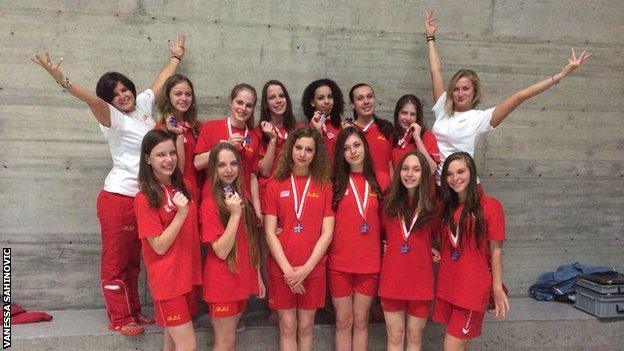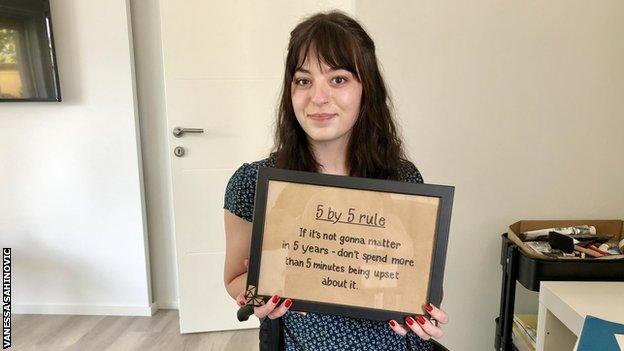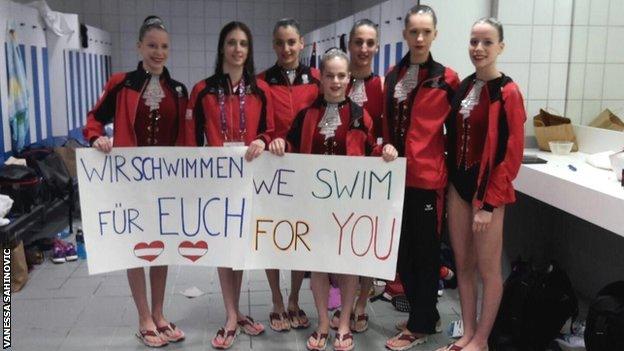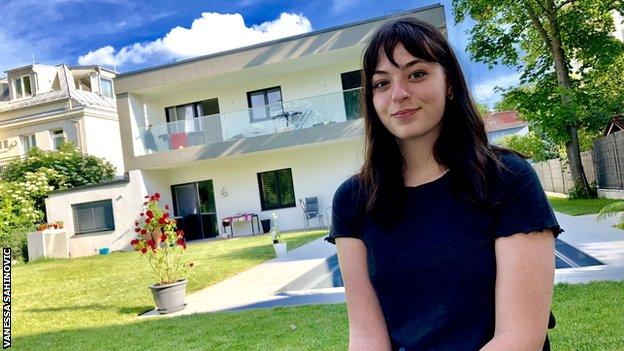Vanessa Sahinovic: Life after paralysis and the fight for compensation
- Published
Vanessa Sahinovic: Life after paralysis and the fight for compensation
"Sometimes when I'm asleep I dream that I'm swimming and it feels real to me, but then when I wake up I'm sad because I realise it was just a dream."
Four years ago Vanessa Sahinovic was one of the rising stars of the Austrian synchronised swimming team, a passionate 15-year-old who fantasised about competing at future Olympic Games and winning medals for her country.
But that dream was taken from her two days before her major event debut when she and her team-mates were run over by a bus in the athletes' village before the inaugural European Games in Baku, Azerbaijan.
While the other swimmers were somewhat fortunate, suffering only bruises and minor fractures, Sahinovic's injuries would prove to be life-changing.
"I was hit by a bus and now I'm paralysed from my belly down," she tells BBC Sport, before an initially surprising beaming smile breaks across her face.
"Luckily I can still use my arms and do everything, but it's still hard for me and I'm still not the best wheelchair driver - I call myself a 'wheeling mess'."
Four years on, both her incredible fighting spirit - which saw her win countless junior sporting honours - and her sense of humour are readily apparent, qualities which have been crucial while she has adapted to and accepted her new life.
Despite having eight major procedures and seeing specialists all over the world, Sahinovic explains that her rehabilitation is ongoing, as is her fight for greater compensation - a situation her mother calls a "scandal".
What happened in Baku?

Vanessa enjoyed junior success with Austria before her accident
On Thursday, 11 June 2015, the Austrian synchronised swimming team were heading to the bus station from their accommodation in the athletes' village for their penultimate training session before the European Games began.
The nine Austrian athletes were on the pavement walking away from a roundabout when an official Games transportation bus swung round the corner and, instead of braking, drove into the group.
The bus, which weighed over three tonnes, ran over Sahinovic and Luna Pajer, with Verena Breit also needing treatment in hospital.
Sahinovic, who suffered 15 fractures, recalls her coach "running and yelling" at her and asking if she was OK, but the swimmer says she was surprisingly calm.
"It wasn't scary at all," she said. "When I was laying there I didn't understand what was going on, so there was no panic."
Pajer, who suffered muscle and ligament damage to her arm, recalls the incident differently and is clearly still shaken by what happened that day.
"I remember being under the bus and it going over my arm, so it was scary and a moment I will never forget," she tells BBC Sport.
"Afterwards was a bit of a blur and it happened very fast, but I remember laying on the floor and then getting up to see if Vanessa was OK."
She was not, and after being transferred to hospital in the capital of Azerbaijan, Baku, and placed in an induced coma, she was then flown on Azerbaijan president Ilham Aliyev's private aeroplane back to her home city Vienna for emergency procedures.
Meanwhile, after a brief visit to the medical centre in the athletes' village, Verena Breit was reunited with her twin sister Rafaela and her other team-mates.
"After the accident I felt no pain, but it was difficult for me as we didn't know what happened with Vanessa, if she was very injured or dead," says Verena.
Rafaela, who was physically unhurt but incredibly distressed, adds: "Seeing all of my friends on the ground was very hard and it affected us all mentally; we all have a very different perspective on life and it changed us."

Vanessa Sahinovic has demonstrated remarkable resilience since the accident that left her paralysed
'Mum, I don't want to be in a wheelchair'
Sahinovic's Bosnia-born parents had experienced emotional upheaval before, having fled the city of Sarajevo after an escalation of tensions during the break up of Yugoslavia led to war in the country in 1992.
However, nothing could prepare them for seeing their daughter in intensive care moments after doctors had revealed news of the paralysis to her.
"Seeing Vanessa like that; I felt like my world was crushed," says her father Safet with a heavy sigh.
Her mother, Azra, fights back tears as she recalls visiting the hospital in Vienna: "I found her crying in the bed, her hair and pillow wet after they told her she'd never walk with her own legs again.
"That scene I'll never forget, when she told me 'Mum, I don't want to be in the wheelchair'."
Understandably devastated, their emotions turned to anger and then relief after a video of the accident, picked up by a security camera, was leaked online.
"At first we didn't want to watch it at all, because we were afraid," says Safet.
"When we actually saw it, it was a bit of relief for us, because we saw what she survived and realised that it could be much worse."
The bus driver, Vali Ahmadov, pleaded guilty in the criminal case against him and was given a three-year prison sentence., external

The Austrian team dedicated their European Games performance to their injured team-mates
'My parents had to carry me and my wheelchair up the stairs'
Sahinovic spent four months in hospital completing the necessary surgeries as well as undertaking "exhaustive" rehabilitation, which included learning how to sit upright and how to use a wheelchair.
"My mum stopped working so she could care for me, help me at home and take me to places so I didn't have to rely on public transport," she says.
Sahinovic describes Vienna as a "beautiful place with beautiful people" but adds, like many major European cities, it is "not made for people in wheelchairs".
However, her first glimpse of how difficult this "new life" would be came at home.
"We were still living in our flat on the second floor without an elevator and I had to wait for my parents to carry me up or down," she says, emphasising that her mum and dad are undoubtedly her "heroes" now.
"It was hard not having the independence I used to have and also when I did go out some people didn't know how to act around me or what to say.
"I also lost many friends I thought were my friends, but I have learnt who my true friends are and they were so important to me."
'My Dad built me a new home'

Vanessa helped design the house her father built for her
Her parents were desperate to make life easier for their daughter.
After Azerbaijan government officials backed up initial discussions with the family's representatives by giving television interviews which indicated they would pay out about £1.5m in compensation, the Sahinovic family began to make plans.
Vanessa's father, who works in construction, took out a sizable loan to buy land in the nearby town of Modling and build a fully accessible, wheelchair-friendly home.
"I really love this house because my father built it for me and we designed it together so it's personal and perfect, where I have no worries at all," she says with a beaming smile.
Although the family are said to have received more than £1m from various sources including the Austrian Olympic Committee and Austrian Swimming Federation, less than £200,000 of that came from the Azerbaijan government.
After nearly three years of legal talks, the Sahinovic family were struggling financially, and feel they were forced into accepting a much lower sum than initially promised.
"We feel like we have been fooled," says Vanessa's father, who is visibly angry when recalling the prolonged negotiations they endured.
Before he can continue his wife interjects and shouts "scandal" and "injustice".
"We watch our daughter in a wheelchair fighting every day," she says.
"Without their promise we wouldn't have built this house, we wouldn't have put ourselves into debt and we would have saved money for her therapies."
The Azerbaijan Olympic Committee has not responded to questions from the BBC concerning the financial settlement made with the Sahinovic family.
The European Olympic Committee and Austrian Olympic Committee said her medical expenses in Austria will be covered for the rest of her life.
They also say that the Austrian government has offered her a full-time job as she was injured while representing the nation, but Vanessa and her family deny a proposal has ever been made.
"I am pretty worried because I know the money will be gone some day," says Vanessa, whose family must pay for any medical treatment outside Austria.
"I don't need luxury, I just want to be able to make my future more safe, to continue with my therapy and maybe then one day my mum won't have to tell me 'OK Vanessa, we don't have any money'."
Since her accident she has had medical procedures in United States, Croatia and Germany, with the latter costing more than £100,000, and she hopes to have further experimental treatments in Moscow in the future.
Life after sport - rediscovering a love of art
Although swimming is a core Paralympic sport, racing has never really interested Sahinovic, and with no prospect of synchronised swimming being added to the Games, she says it's "unlikely" she will pursue a career in sport.
But the 19-year-old's incredible resilience - similar to that demonstrated by German Olympic cycling champion Kristina Vogel, who was paralysed by a crash in training last year - means she has set new goals and is determined to explore her other passions and talents.
"When I was 14 the big question was what to do with my life, whether to go to a sports school or an arts school, and I chose the sports school," she reflects with a smile.
"I guess sport wasn't the right way, so now I have a chance to choose the other way and I'd love to study fine art at university.
"When I was a child I loved having a pencil in my hand and drawing mermaids, cartoons and flowers, but now it takes me into another world where I forget all of the problems I have in my life."
'I believe one day I will walk again'
Despite her struggles - she says she is "still adjusting" to life in a wheelchair - Sahinovic is incredibly positive about her future.
She regularly meets up with her old team-mates and cheered them on from the stands as they competed at the European Championships in Glasgow last year.
"In the beginning I really wanted to jump into the water and do the routine with them, but now I can hold myself back and I know there's a lot I can achieve in my life," she says.
"I still think about this [not walking] as a current situation, for maybe five to 10 years.
"I know the medicine is not there now but I'm hoping it improves and I believe one day I will walk again."
BBC Sport has launched #ChangeTheGame this summer to showcase female athletes in a way they never have been before. Through more live women's sport available to watch across the BBC this summer, complemented by our journalism, we are aiming to turn up the volume on women's sport and alter perceptions. Find out more here.